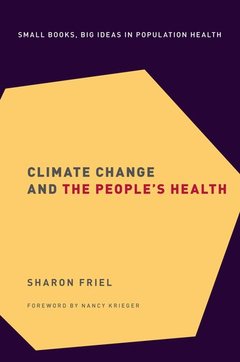Description
Climate Change and the People's Health
Small Books Big Ideas in Population Heal Series
Author: Friel Sharon
Director of collection: Krieger Nancy
Language: English
Subjects for Climate Change and the People's Health:
Approximative price 32.23 €
In Print (Delivery period: 21 days).
Add to cart
Publication date: 02-2019
224 p. · 15.3x18.4 cm · Hardback
224 p. · 15.3x18.4 cm · Hardback
Description
/li>Biography
/li>
Climate change and social inequity are both sprawling, insidious forces that threaten populations around the world. It's time we start talking about them together. Climate Change and the People's Health offers a brave and ambitious new framework for understanding how our planet's two greatest existential threats comingle, complement, and amplify one another ? and what can be done to mitigate future harm. In doing so it posits three new modes of thinking: · That climate change interacts with the social determinants of health and exacerbates existing health inequities · The idea of a "consumptagenic system" ? a network of policies, processes, governance and modes of understanding that fuel unhealthy, and environmentally destructive production and consumption · The steps necessary to move from denial and inertia toward effective mobilization, including economic, social, and policy interventions With insights from physical science, social science, and humanities, this short book examines how climate change and social inequity are indelibly linked, and considering them together can bring about effective change in social equity, health, and the environment.
Sharon Friel, PhD, MsC, is Professor of Health Equity and Director of the School of Regulation and Global Governance (RegNet), Australian National University. She is also Director of the Menzies Centre for Health Policy ANU. She is a Fellow of the Academy of Social Sciences Australia. Between 2005 and 2008 she was the Head of the Scientific Secretariat (University College London) of the World Health Organisation Commission on Social Determinants of Health. Her interests are in the political economy of health; policy, governance and regulation in relation to the social determinants of health inequities, including trade and investment, food systems, and climate change.
© 2024 LAVOISIER S.A.S.




